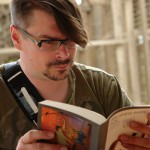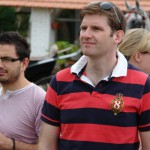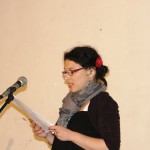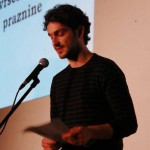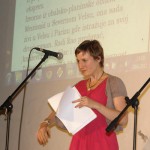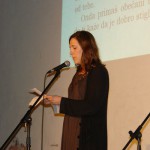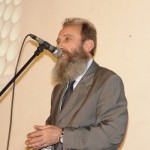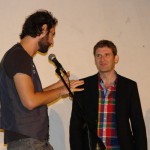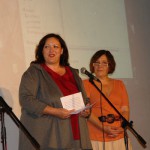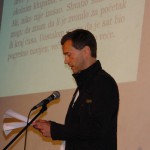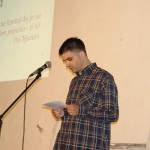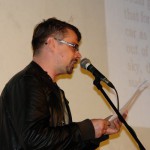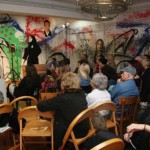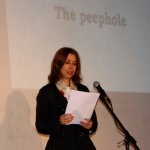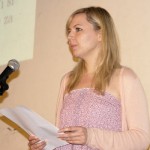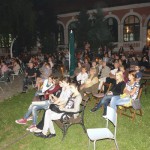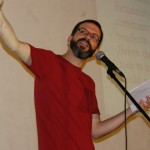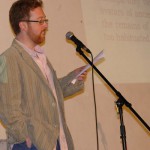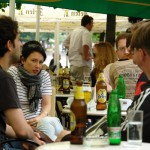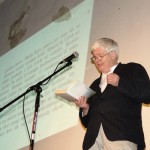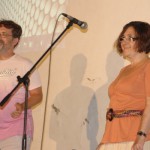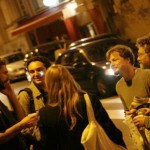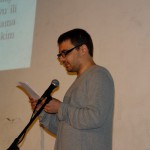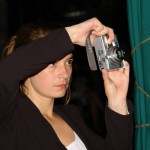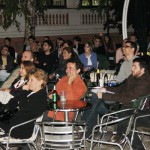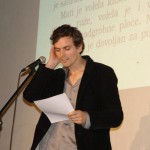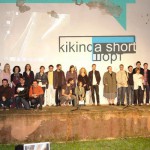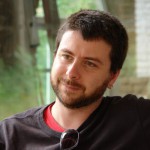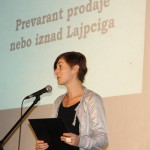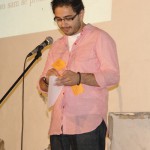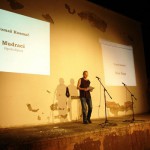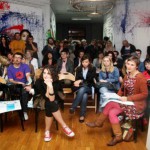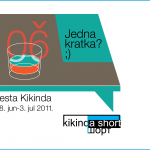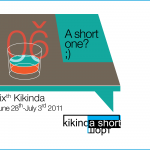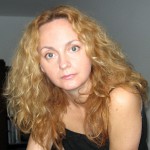Kikinda Short 06
Od 28. juna do 03. jula 2011, u Kikindi i Beogradu, održan je šesti međunarodni Festival kratke priče KIKINDA SHORT u organizaciji Udruženja ”Kikinda Short”. Na ovogodišnjem Festivalu nastupila su 23 autora iz 18 zemalja što je najveći broj učesnika, zemalja, ali i različitih jezika do sada. Organizatori su u Srbiju doveli veliki broj pisaca iz zemalja koje do sada nisu participirale na Festivalu (Češka, Italija, Norveška i Portugal), ali i određeni broj autora čija su dela već prevođena na srpski jezik (Norminton, Rudiš, MekLaverti).
Festival je otvorio ministar kulture, informisanja i informacionog društva u Vladi Republike Srbije Predrag Marković u prepunoj bašti Narodne biblioteke „Jovan Popović”. U Kikindi, 29. juna, kikindskoj publici se predstavilo trinaestoro autora. Čitanje je otvorila Šan Melangel Dafid iz Velsa, zemlje specijalnog gosta ove godine, a nakon nje su svoje priče čitali Mića Vujičić (Srbija – domaćin Festivala), Ulrike Almut Zandih (Nemačka), Tomaž Kosmač (Slovenija), Kiralj Kinga Julija (Rumunija), Tejs de Bur (Holandija), Kalja Papadaki (Grčka), Žarko Kujundžiski (Makedonija), Ivi Vajld (Engleska), Bjarte Brejtejg (Norveška), Erik Gotje (Kanada), Gregori Norminton (Škotska) i Jelena Lengold (Srbija) – gost iznenađenja po izboru ovogodišnjeg kritičara-pisca Jasmine Vrbavac. Neformalno druženje sa autorima nastavilo se na koncertu kikindskog benda Drvo truo do 2 časa po ponoći.
Reč ministra
“Kikinda Short“ za dugovečnost kulture
Kikinda, 29.6.2011.
Ministar Predrag Marković je večeras u Kikindi otvorio 6. Međunarodni festival kratke priče “Kikinda Short“.
 – Mnogo je razloga zbog kojih Ministarstvo kulture podržava ovaj festival. Prvi razlog ste vi, drugi razlog su čitaoci, a treći, najvažniji, jeste što “Kikinda Short“ u nekoliko elemenata ispunjava ono što je u opisu obaveza, ne jednog ministarstva, već čitavog niza organizacija, vlada i država. Ministri zemalja Jugoistočne Evrope – od Italije do Moldavije, od Slovenije do Turske – potpisujući Beogradsku deklaraciju obavezali su se na čuvanje ne samo materijalnog i nematerijalnog nasleđa, već i na podsticanje mladih, kreativnosti i umrežavanja.
– Mnogo je razloga zbog kojih Ministarstvo kulture podržava ovaj festival. Prvi razlog ste vi, drugi razlog su čitaoci, a treći, najvažniji, jeste što “Kikinda Short“ u nekoliko elemenata ispunjava ono što je u opisu obaveza, ne jednog ministarstva, već čitavog niza organizacija, vlada i država. Ministri zemalja Jugoistočne Evrope – od Italije do Moldavije, od Slovenije do Turske – potpisujući Beogradsku deklaraciju obavezali su se na čuvanje ne samo materijalnog i nematerijalnog nasleđa, već i na podsticanje mladih, kreativnosti i umrežavanja.
To je, u stvari, kratak opis ovog festivala. Za samo šest godina, vi ste uspeli da okupite toliko mladih ljudi, uspevate da omogućite da se dobro čuje ne samo forma, već i jezik, nastojite da ovaj festival ne završi samo u tih nekoliko dana, već da traje cele godine, da se iskustva razmenjuju i da iz toga proizilaze širi projekti – istakao je ministar Marković otvarajući kikindski festival kratke priče.
Uprkos kiši koja je celog popodneva 30. juna padala u Kikindi, pisci i organizatori su odlučili da se i drugo veče Festivala održi u bašti Biblioteke i nisu pogrešili. Kiša je prestala, a hladno veče nije sprečilo publiku da sasluša i drugu grupu učesnika. Čitanje je započeo Neven Ušumović (Hrvatska), a za njim su čitali Veronika D. Nikulesku (Rumunija), Jaroslav Rudiš (Češka), Adam Marek (Engleska), Đorđo Fontana (Italija), Petar Denčev (Bugarska), David Mašado (Portugal), Jasmina Vrbavac (Srbija) kritičar-pisac, zvezda Festivala – Bernard MekLaverti (Škotska), a zatvorila ga je Holi Hauit (Vels). Uz muziku rok-sastava The Sons of Radica autori i publika su se družili do kasno u noć.
U odsustvu koordinatora Festivala Srdjana Papića, prvo veče su vodili Mirjana Đurđević i Vladimir Arsenić, a naredno je uz Mirjanu Đurđević bio Marko Pogačar.
Organizatori su se potrudili da i ove godine pokažu svojim gostima grad u kojem su ih ugostili. Obišli su Narodni muzej i, pored ostalog, videli ostatke mamuta Kike. Nakon obilaska Kikinde vožnjom fijakerima, posetili su stari pogon ciglane u kome se održava simpozijum Terra.
Pored autora, na Festivalu su bili gosti i književnica Mirjana Đurđević (Srbija), prevodilac Nataša Miljković (Srbija), književni kritičar Vladimir Arsenić (Srbija), književnik Edi Matić (Hrvatska), urednik Marko Pogačar (Hrvatska, selektor Roland Orčik (Mađarska), literarni agent Džejmi Kolman (Engleska) i urednik Džim Hinks (Engleska).
Tekstove za ovogodišnji Festival prevodilo je na srpski jezik dvadesetoro prevodilaca: Ala Tatarenko, Aleksandra Petrović Korda, Biljana Isailović, Bojana Gajski, Branislava Tomić, Elizabet Vasiljević, Ema Mimica, Erna Zedi, Irina Đuran, Ivana Šćepanović, Jovan Tatić, Mirna Stevanović, Nataša Miljković, Niki Radulović, Paola Petrić, Sonja Bogosav, Tanja Brkljač, Velimir Kostov, Vladimir Arsenić i Zorana Rackov.
Beogradski partner Festivala, Ustanova kulture „Parobrod”, pokazao je mnogo veći oprez i prvo veče čitanja u Beogradu, 1. jula, odvijalo se u zatvorenom prostoru u Kapetan Mišinoj 6a. Publika je i u Beogradu pokazala veliko interesovanje i „Parobrod” je bio prepun. Već sledeće večeri čitalo se na Kalemegdanu, u Muzičkom paviljonu i, po prvi put za šest godina koliko se održava Festival, pronađen je odgovarajući prostor u Beogradu. Program je i u Beogradu, na smenu, vodila trojka – Mirjana Đurđević, Marko Pogačar i Vladimir Arsenić koja godinama prati Festival.
U „Parobrodu” se 2. jula sa početkom u 12h, održala tribina sa temom Uloga literarnog agenta na savremenom tržištu knjiga. Na na tribini su govorili Aleksandra Rašić, operativna urednica „Stubova kulture”, Džejmi Kolman i Jaroslav Rudiš. Moderatori su bili Srđan Srdić i Vladimir Arsenić.
Utisci
—————-
Samo želim da kažem – mnogo hvala – što ste me pozvali u Kikindu. Divno sam proveo vreme i na kraju sam bio tužan što odlazim . Napisao sam danas članak o Festivalu Kikinda Short za Sunday Times Online – oni, takođe, žele i neke fotografije. Imam neke, a ima dobrih Kalijinih i Edijevih – javite mi ako ćete postaviti neke nove. Javiću kada će članak biti postavljen.
Sve najbolje,
Adam
—————-
—————-
Pozdrav svima!
Samo želim da kažem nekoliko stvari. Bilo je sjajno upoznati vas. Provela sam neverovatno vreme. Najzad sija Sunce, imaćemo nekoliko dana pravog leta. I da, Atina se vraća u normalu i prilično je tiha :)))) Dakle, sada se opustite – ništa se neće desiti i uživajte u ostatku leta.
Veliki topli zagrljaj.
Kalia
—————-
—————-
Pozdrav!
Potpuno se slažem! Pariz je sparan. Umrtvljena sam od iscrpljenosti i imam jedan dan za mejlove da se vratim svom životu, sa 6. sprata. Privilegija je bila provesti nedelju dana sa svima vama. Javljajte u vezi sa stvarima koje vam se dešavju, novim knjigama, ili ako prolazite kroz Pariz ili Vels.
Cariad,
S ljubavlju,
Šan
—————-
—————-
Dragi moji,
Srbija je pusta bez vas. Čak ni voda u Kikindi nije više žuta. Ostajemo u kontaktu,
Voli vas Mira
—————-
Potpuno se slažem s Mirom. Nedostajete mi.
Voli vas Čiča
—————-
Odjek sam svih ostalih: nedostaje mi Srbija! Hvala svima koji su doprineli tako zabavnoj i nezaboravnoj nedelji.
Holi
—————-
—————-
Budim se ujutru i nema cimera. Odlazim u kupatilo, a u njemu potpuno nova kada. Sedim u kafiću i čujem samo makedonski, a nekoliko koraka dalje jedem burek sam. Odlazim u kuhinju i nema mesa za ručak. Nešto stvarno nije u redu.
Hvala na mnogo lepog vremena u Kikindi i Beogradu.
Pozdravi iz Skoplja,
Žarko K.
—————-
—————-
Vaša osećanja su moja osećanja,
Tomaž
—————-
—————-
Nedostaju mi Kikinda, Beograd i Kalemegdan, a najviše mi nedostajete svi vi. Hvala na divnoj, divnoj, divnoj nedelji. I deljenju fotografija. Nadam se da ćemo se sresti opet. Nekada, negde.
Veliki zagrljaj iz Sibiua.
Veronika
—————-
—————-
Već mi se čini da je bilo davno. Hvala vam na fantastičnoj nedelji.
Ivi Vajld
—————-
—————-
Uistinu, zvuči ludo vratiti se svojoj normalnoj rutini. Hvala vam na ovom neverovatnom iskustvu.
Đorđo
—————-
—————-
Dragi moji,
Potpuno se slažem sa svima. Bilo je divno. Uzgred, Đorđo, šta je normalno? 🙂
Zagrljaj svima,
Kinga Julija (i prase Tobi)
—————-
—————-
Dragi moji,
Sofija se čini kao veoma dosadan grad. Vrativši se, i ja osećam dosadu. Nedostaje mi vreme sa vama. Sa svima se slažem. Hvala na divnom vremenu. 🙂 I nadam se da ćemo se uskoro videti.
Pozdrav,
Petar Denčev
—————-
—————-
Najbolje vreme koje sam ikada imao uz miris jaja. Mnogo ljubavi za sve vas sa mesom i krompirom.
Džejmi.
—————-
—————-
Dragi moji,
pored zagrljaja koje vam šaljem, moram vam reći da mi iskreno nedostaje prase Tobi. Mirjana i ja smo ga, posle svega, umalo usvojili.
Sve najbolje iz vrelog Zagreba
Marko
—————-
—————-
Dakle, moj predlog je: 1) svako od nas organizuje festival kratke priče u svojoj zemlji; 2) svako od nas poziva ostale na svoj festival; 3) svako od nas ide na ostale festivale; 4) (nisam siguran šta bi 4) trebalo da bude); 5) svako od nas se vraća u svoju zemlju da otkrije kako mu nedostaje zabava, razgovori, i čitanja, i loša hrana, i dobra hrana, i pivo i prijatelji; 6) sve počinjemo iz početka
Hvala na zaista nezaboravnim danima
Voli vas (iz Portugala)
David
—————-
—————-
Pozdrav svima!
Žao mi je što kasnim. Ali, hvala vam svima na divnom vremenu. Bila je to istinska avantura. Trudićemo se da Janeke čita sledeće godine tako da se možemo vratiti. I svima ću reći: Prošle godine je bilo mnogo bolje.
I verovatno ću prihvatiti poziv za svaki festival koji organizujete u svojim zemljama.
Vidimo se. Sve najbolje iz Amsterdama.
Tejs
—————-
—————-
Hvala, Tejs. Zakasnelo zdravo svima iz tmurnog i veoma vlažnog Edinburga. Zadovoljstvo je bilo čitati mejlove koji su potvrđivali kako je svima bilo lepo u Srbiji. Moja nostalgija za razgovorima i pivom se sleže, ono što ostaje je vedro sećanje na izvanredno druženje. Hvala Srdjanu, Veri, Vladimiru, Džimu i svima ostalima koji su učinili da se osećamo dobrodošli. Bilo mi je zadovoljstvo.
Do sledećeg viđenja,
Gregori
—————-
—————-
Pozdrav svima,
Kikinda je nezaboravna iz više razloga. Biti u gomili tako talentovanih mladih pisaca je bilo divno iskustvo. Nazdravimo sebi starom škotskom zdravicom „Da budemo srećni i da naši neprijatelji znaju to”.
Sve najbolje,
Bernard i Madlen
—————-
Vau, nikada nisam čula tu zdravicu i od sada ću početi da je koristim. Hvala. Radost iz Pariza. Nadam se da ste svi dobro.
Šan
—————-
—————-
Zdravo svima,
Jesam li stvarno poslednja koja razvija svoju zastavu? Nazovimo to samo „nemačkim odlaganjem“. Želim samo da kažem hvala Srđanu i njegovom osoblju koji su nam priredili nezaboravne dane i ne samo zbog Stiven King hotela. 🙂 Hvala vam na toplini i gostoprimstvu i vidimo se u nekoj od naših zemalja. Vidimo se uskoro, momci. Laku noc.
Ulrike
—————-
—————-
… a ovo je „češko praško odlaganje“. Mi smo uvek poslednji i najsporiji, možda zbog jačine piva. U svakom slučaju, kikindski burek je bio najbolji.
Jaroslav
—————-
—————-
Ne, mislim da sam ja stvarno poslednji koji svima vama divnim ljudima nazdravlja. Nije mi bio cij da ponovo nestanem. Trenutno sam u Poljskoj u kojoj, još uvek, mogu da naručim „pivo“.
Hvala vam svima na stvarno nezaboravnoj nedelji.
Najlepši pozdravi iz Krakova,
Bjarte.
—————-
Jedna kratka!
Kratko s Mićom Vujičićem
 Šta festival KIKINDA SHORT predstavlja u lokalnom, a šta u regionalnom smislu?
Šta festival KIKINDA SHORT predstavlja u lokalnom, a šta u regionalnom smislu?
U regionalnom smislu, KIKINDA SHORT je jedan od najvažnijih književnih festivala. Pogotovo zbog toga što ima tako dobar temelj kakav jeste kratka priča. Ali, šta predstavlja u lokalnom smislu? Smem li da citiram… U tekstu „Nad Njegoševom prepiskom“ Ivo Andrić prenosi pesnikove reči kad veli: „Tjesno mnje otvsjude“. Zbunjuje me pomalo ovo pitanje koje se tiče prostora – zar kratka priča nema problem s vremenom?
Evo onda „lakšeg pitanja“. Da li je kratka priča sabijanje prostora ili vremena?
U jednom od svojih najčuvenijih eseja „Soba i po“ Josif Brodski opisuje kako su posle rata, u skladu s politikom „sabijanja“ buržoazije, anfaladu podelili na manje celine. Svaka porodica je dobila jednu sobu, a između su podignuti zidovi od šperploče. Na kraju, Brodski kaže: „Ako se u prostoru krije ideja beskonačnosti ona nije u širenju, već u njegovom sabijanju. Makar zato što je sabijanje prostora mnogo jasnije. Bolje je organizovano i ima više naziva: ćelija, sobica, grob.“
Na koji se način „slušanje“ razlikuje od čitanja?
Kako reče naš zajednički urednik: „Čitanje je privatna stvar!” Ne znam zašto, ali poput novinarke Milke, glavne junakinje jedne Tešinove priče, mogu da kažem da mi ponekad zasmeta glas pisca. Sećaš se te pripovetke? Milka čita nekakvu knjigu i nervira se, jer ne može da izbaci iz glave iritirajući glas pisca koga inače poznaje. Ako govorim o sebi kao čitaocu, o čitanju ili slušanju – tu sam negde, na tom tragu… Tvoje pitanje o „glasu”, podsetilo me je na jednu kratku priču koju nikada nisam uspeo da napišem. U mini seriji o istoriji jugoslovenskog fudbala, sportski komentator Marko Marković detaljno je opisao kako je komentarisao čuveni meč Hajduk – Zvezda iz 1980. godine. Pre nego što je predsednik opštine Split Ante Skataretiko ušao na teren i saopštio vest da je umro Josip Broz Tito, Marku Markoviću su sa Radio Beograda tajno javili: „Prenosi nižim tonalitetom!”
Šta publiku u Kikindi privlači na ovakav književni događaj?
Ekskluzivni gosti, dobre kratke priče, druženje. Leto, čitanje u jednom dahu, potreba za glasom pisca koji će možda čuti kasnije kad ostanu sami sa knjigom; želja za sabijanjem prostora ili vremena – otkud znam.
Kratko s Tomažom Kosmačem
 Šta NE očekuješ od učešća na festivalu?
Šta NE očekuješ od učešća na festivalu?
Od učešća na festivalu NE očekujem odrešenja.
Video si listu učesnika ovogodišnjeg festivala. Da li ti se čini dovoljno interesantnom?
Listu učesnika video nisam, a i svejedno mi je. Nadam se barem, da pišu kao Komandant Mark ili Veliki Blek. Ne volim „umetnike” koji hvataju oblake i sunce, a žive u magli
Kakav je odnos slovenačke publike i kritike, ali i izdavača prema autorima kratkih priča?
E, baš si me usrećio sa trećim pitanjem! U Sloveniji (ubij me, ako se varam!) kratka priča živi kao zlato. Problem je u tome što nagrađuju priče, koje niko ne razumije. Čast iznimkama. Obični čitalac kaže: Ako je ovaj najbolji, koji ću kurac čitati ostale?! Kritičari i izdavači su dobri, ali žiri je jedno, publika drugo.
Šta bi, po tvom mišljenju, bila elementarna razlika između slušanja na festivalima i književnim večerima i starog, dobrog čitanja?
Literarno veče zamišljam ovako: čitanje 15 minuta, glazbeni spot, čitanje 10-15 minuta, glazbeni spot i pitanja auditorija. Ako je interes, još malo čitanja, inače hapšenje autora!!
Više fotografija na Fejsbuku
 Pokrajinski sekretarijat za kulturu Pokrajinski sekretarijat za kulturu |
 Ministarstvo kulture, informisanja i informacionog drustva Ministarstvo kulture, informisanja i informacionog drustva |
 |
 |
 |
 |
 |
 |
|
 |
 |
|
 |
 |
|
 |
 |
|
 |
 |
 |
|
|
 |
|
Medijska podrška |
||
 |
 |
 |
 |
 |
|
 |
 |


























